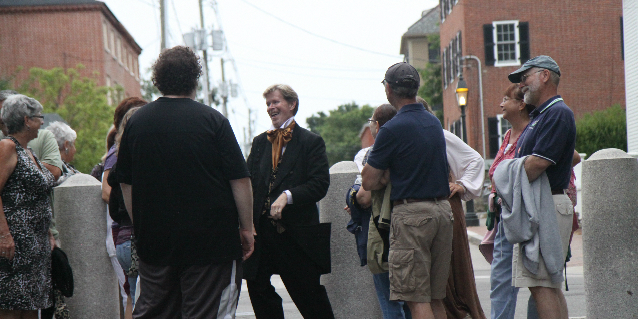
People generally regard history as something that is more akin to a chore than a real pleasure. The style of the Portsmouth Underbelly Tour is more vaudeville and burlesque and it would be better suited to a stage than a library. Because of the theater background that the guides hail from it is as important to be entertaining as it is to get the history correct. We believe that you would rather hear the stories and what they meant to the people experiencing them rather than hearing an endless drone of dates and places. Don’t get me wrong, what is a history tour with proper history but there are ways to present material, which will actually help you remember them longer than the length of the tour. Every Monday and Saturday at 6pm during the summer months that is what we strive to do!
If history is going to be remembered and relayed than the manner in which it is presented has some catching up to do! Who wants to walk the streets feeling like they are in a dry airless classroom? Wouldn’t you rather have your history spiced with a dirty joke, a wink and a smile? Our interactive style relies also upon who is on the tour at any given time. This improvisational aspect of our tour means that no two tours are ever the same. While making history every time a new tour starts we are eager to involve you into every tale of murder, scandal and intrigue that is hiding around very corner.
More importantly the tour is not television where you an sit back and watch while not becoming involved. The guides speak directly to you, try to get a smile out of you and better yet a laugh as they relay the mayhem that this city has witnessed. Sure you have heard of George Washington, Paul Revere, Daniel Webster, Governor John Langdon and John Paul Jones but guaranteed you have never heard the stories we are going to tell! Many of our guests return multiple times to hear new stories, new (bad) jokes and a new telling. Many guests will bring their visitors back for a second dip into the pond!
The Portsmouth Underbelly Tour runs every Monday and Saturday, 6pm from mid-June to the end of September. If those days don’t work for you don’t get all excited because we book private tours almost as often as we do scheduled tours. Gather a group of 15 people or more and we can be yours. In the past we have done specialty tours for bachelor and bachelorette parties, corporate functions and get- togethers, birthdays, showers and anniversaries! After 11 years the tour is still just $10 however it is only polite to tip the wench. Think of her as your server only she doesn’t bring you liquor! (well, not in a glass anyway!)
The Portsmouth Underbelly Tour is thriving because people want to know the history of the city – they just don’t have to want to sit down and learn it. WIth this tour, you can have your cake and eat it too and even better, your cake will be served by a buxom wench of questionable morals and a spy who is looking to steal your heart. Sounds like a perfect evening!
A History of Portsmouth in A Nutshell
Portsmouth, New Hampshire is like no place else in New England. It has often been called the jewel of the crown of the Seacoast but for many it is the last bastion of civilization before heading into the rural netherworld of the North (or as we like to call it “the boonies”) . If Portsmouth is the cosmopolitan part of the state then it is an adopted cousin that doesn’t quite fit in with the rest of the crowd. Portsmouth has cafes, theater, ballet and culture and the rest of the state has rocks, rocks and more rocks. There are beautiful mountains, lakes, and wilderness but it is all squeezed in between the granite rocks.
You can blame most of this difference due to the fact that Portsmouth is a port where for the last 400 years ships from all over the world have been entering the city through the Piscataqua River (second fastest current in the country according to National Geographic). With their arrivals came new goods, new fads and cultures that the locals absorbed and made their own – no wonder they turned out to be so different from their in-state brothers. However, before we talk about the future we must first look to where we started because when Portsmouth was founded in 1623 it was nothing more than a stop in search of goods to feed the bloated British. (Obviously they were not waiting for much needed dental supplies!)
Portsmouth is like most early colonies where people left Britain in search of a better life. Unlike Plymouth, whose founders sought religious freedom, the founders of Portsmouth came here to fish. The early settlers were more concerned about making a life outside of Britain than looking for a place to worship. It was commonly believed that filling one’s belly was more important than filling one’s soul, at least in the short term. Britain needed food to send off to its various colonies and the East Coast of what soon would be America had plenty to spare. In fact Portsmouth was settled and quickly became the fast food restaurant of the East shipping out thousands of tons of Ye Olde Filet o’ Fish!
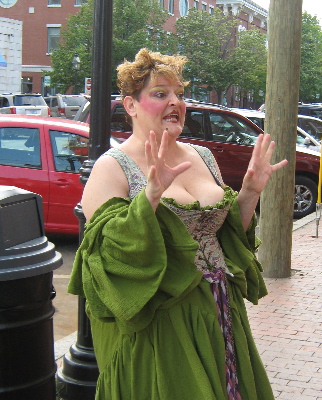
Marian Marangelli as Minerva
Cod was the meal of the day and the shores of New England were teaming with the fish that was sun dried on the nearby Isles of Shoals before being sent back to Brittan. Logging and eventually farming became staples of the city but it was shipbuilding that eventually leads Portsmouth to rival Boston as the premier city of the Northeast. New Hampshire, which was governed by Massachusetts in the early days, was a forest that went on seemingly forever. Its tall trees were perfectly suited for ship masts and when the trees had been exhausted the people looked for a new trade.
You could never make any real money by despising something despite the success of Glenn Beck and Rush Limbaugh but the people of New Hampshire would trade a weekly paycheck in order to have its border shared with any other state than Massachusetts. To this day the people of New Hampshire look at their southern neighbor with disdain and not a little contempt while honoring them with the nicknames of “Mass-hole” or “Tax-achusetts.” Granite-staters don’t like the way they talk, drive or invade our state for their weekend pleasures while jamming our highways and liquor stores. If it weren’t for this disdain we here in New Hampshire would have no feeling at all for our Massachusetts cousins to the South.
The people of New Hampshire have always felt a bit slighted when it comes to the countries perception of Massachusetts. After all, we were settled before Boston and yet much of the country thinks of Boston as the city that started our revolution. We here in New Hampshire disagree though we will give the state its due for dropping the “er” off the word “chowder” and pronouncing it as if you have a lazy lip and for replacing most of the “r”s in the alphabet with the letter “h”. (See: Hahvad Yahd). Oh yeah, we do appreciate the Boston Red Sox (sometimes), the New England Patriots (most of the time), and the Boston Bruins (Who? Depending on the year!). Boston does have the Charles River but we have the Piscataqua River which is the second fastest river in the country! So put that in your bean-pot and roast it!
Portsmouth was perhaps no more scandalous than most burgeoning cities but it did exercise a bit more flair and had a pretty good guest list. Let us not forget that Daniel Webster studied law here; Paul Revere rode here, not on his famous ride but he did come here with a warning and George Washington slept here several times. Now Washington bedding down for the night is no reason to herald this city as he tended to sleep almost everywhere, however, Portsmouth does boast three signers of the Declaration of Independence, an international Peace Treaty and Geno’s Chowder House, a small restaurant where all Republican candidates seeking a presidential nomination must eat and emerge anointed before going out into the rest of the country. It does seem odd that the eatery is better known for greasing political candidates than it is for its food.
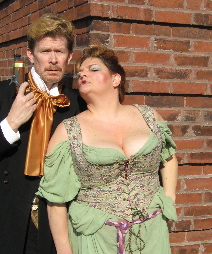
Silas and Minerva always meant business!
Like most coastal cities Portsmouth has it’s share of revolutionary era forts and embattlements but we also have the oldest military installation in America with the Portsmouth Naval Shipyard. Though many members of the Continental Congress did not want the headache or the expense of sustaining a Navy a series of attacks on its merchant ships eventually forced the hand of the new country. That Navy yard, which is either in New Hampshire or Maine depending on who you ask or what year it is, has been a godsend to the local economy and a thorn between the two states for centuries.
The navy yard, regardless of which state it’s in (it is currently in Maine) has played host to more than just that argument. Prisoners from the Spanish-American War were encamped there and the yard hosted the Treaty of Portsmouth, which ended the Russo-Japanese War and which yielded Teddy Roosevelt the Noble Peace prize, though he never laid a foot in New Hampshire for fear the pact would not be signed. But it was in the 1800s that the yard did what it does best and that is to build ships better and faster than anyone!
More than 35 vessels were built on the yard during the 1800s and those ships changed as often as sailors professed love to a girl on a Friday night. The century started off with schooners and sloops, moved into steam and frigates and gunboats during the mid-part of the century and then later to tug boats, side-wheel steam gunboats and steam frigates. The yard changed with the times and found prosperity in the new century building and maintaining submarines.
Ship building in the later 1800’s gave way to agriculture, as the new country only needed new ships for new wars. Once we hit the 1900’s the building and maintenance of submarines during the Second World War and later the re-tooling of these under water ships gave the shipyard a new life in the late part of the 1900s. The yard has been on the base closer list ever since there was a list but many believe it is immune to the politics that surround these decisions mainly because two states claim ownership. The fortunes of the city that surround this yard have surged and waned as often as the tide.

What a lady!
For many the city is defined through its relationship with the Navy Yard. Two gates and three bridges are often clogged with the thousands of workers that go there daily but it is also those workers who in the last century who were responsible for the many neighborhoods and schools that now make up what is referred to as “old Portsmouth”. As many of the prostitutes will tell you the town cannot grow without a healthy amount of se(a)men.
When there was a war Portsmouth thrived due to its vibrant shipbuilding industry however business, much like a strumpets garters, lifted and fell due to the whims of unforeseeable needs. Large beautiful Federal and Georgian houses were built and abandoned leaving squalor along the riverbanks where there was once majesty. The cities South End was either the pinnacle of luxury or an abandoned dockyard depending on the century and decade. Once the mannered people left the river the empty houses were taken over by immigrants who were looking for work and a cheap place to live.
The South End, which is currently the most expensive place to live in Portsmouth, has spent more time being at the bottom of the barrel then at the top of the heap. A large surge of Russian Jews in the early part of the 1800’s garnered the area the nickname of “Palestine Beach” because of its large Jewish population. Now those same houses are worth millions and we can be sure that everyone dickered at the eventual selling price.
Federal urban renewal robbed the city of its North End where the majority of the Italian population lived as more than 400 houses were leveled in the name of progress. Luckily, the South End was spared the same destruction thanks to the work of historian Dorothy Vaughn who saw value in these old abandoned houses. The history that was so often swept under the carpet would soon be the cities most valuable commodity. Names like Washington, Whipple, Revere, Wentworth and Jones brought the city stature and a much-needed economic boost when we needed it the most.
How valuable is history? Valuable enough to save Portsmouth from dying out in the late 1970s after the closure of the Air Force Base in the adjoining town of Newington. Thousands of people merely left the city leaving schools half-full and businesses without any customers. It was history the city had to sell and it was the cities past that brought people back to town. Suddenly the many historic houses, many of which had been saved from the wrecking ball at the last minute, were giving the town a new life. These houses supplied the economic engine to get the town back on its feet but the many years of putting people on their backs was what put money in their coffers. During the turn of the last century it was the nightlife that eventually set the city apart.
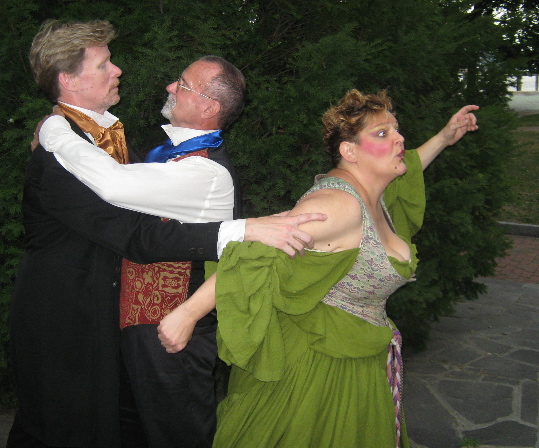
You can run but you can never hide from the fun!
Where there are ports there are bars and where there are bars there are whorehouses. Portsmouth was known early on as a city that had a taste for liquor and women. The red light district boasted more than 11 houses of ill repute who’s “customers served” sign would even make any sailor blush and be the envy of every McDonalds restaurant. During the late 1800’s girls were dressed and put on parade throughout the town so everyone could get a good look at what was being offered that evening. Girls in the houses were even rotated so that there would always be something fresh to offer the more than 1,500 nightly customers. There was lots of money to be made and none of the madams, male or female, had any qualms regarding how they went about it
The oldest profession thrived in the seaport for more than 40 years before it imploded upon itself due to the crime that these houses brought to the area. Girls were truly treated like possessions and there was no shame for any political figure or head of state to be found among the list of customers. The only thing the red light district of the early nineteen hundreds lacked was Heidi Fleiss and a Zumba Studio.
For many years Portsmouth survived and thrived due to its vices. In the 1700’s Portsmouth boasted more than 15 pubs where information and women were passed from hand to hand. Frank Jones, the largest producer of beer in the world called Portsmouth his home. Fights were spilling out into the street not over the score of the big game but whether or not the country should remain loyal to the empire who many felt was oppressing them. Revolution was in the air and civil disobedience started to occur almost as often as a sailor would drop his drawers in a brothel.
The history of the Northeast is not all written on the streets of Portsmouth but it does have its share of stories that make it the jewel of the Seacoast. It’s not necessarily the successes that make Portsmouth such an interesting place to live but rather its failures. Try as we may to cover them up they all rear their ugly little heads just when we think it is safe to come out again. The re-bricking of the cities sidewalks, which has been happening for the last 20 years, just puts a veneer and a covering on what really makes this town great: it’s surprises.
Those surprises come in all shapes and sizes and colors and packages. For the last forty years the main selling point to tourists has been the telling of its history. While most people prefer to focus on dates and mortar there are other ways to tell the cities stories. Portsmouth has always had a great sense of humor about itself and you will find that humor in this telling: It makes the blemishes appear a bit nicer too!
The scars, bumps, bruises and hickeys are the blemishes that Portsmouth’s underbelly boasts and she is proud of each and every one. Though the town has been re-made in recent years by a Brick Act that has gotten out of control it still has many of the markings that made Portsmouth more infamous than famous. After all there was a very popular phrase in the 1700s. “If you wanted to pray you went to Plymouth. If you wanted to party, you went to Portsmouth.” So, let’s get this party started….”
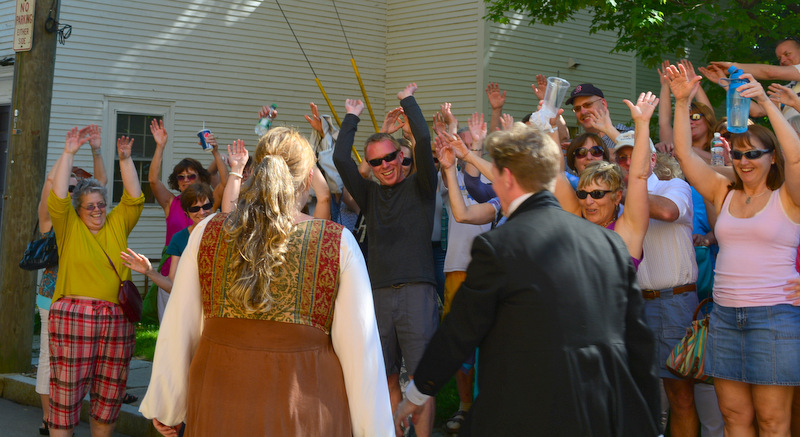
Too much fun for a normal history tour!

